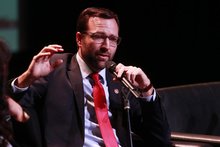0
Research
Community:
Feb 20, 2019
As the US Department of Housing and Urban Development (HUD) prioritizes programs to help households receiving rental assistance achieve economic self-sufficiency, researchers, policymakers, and advocates debate the utility of work requirements as an effective pathway toward economic self-sufficiency and the risks of offering rental assistance on a conditional basis. This study contributes additional evidence suggesting that work requirements, when implemented gradually and in context with hardship exemptions and local supports, can boost annual household income, earnings, and the adult-employment ratio* for low-income households with no work history. But work requirements have little effect on those with prior earnings.
Authored by: Han Bum Lee and Paul E. McNamara for Housing Policy Debate (How Housing Matters, Urban Institute)
Topics: Asset building, Housing, Legislation & Policy, Low-income, Research, Workforce development
 Shared by Housing Is
Shared by Housing Is
Housing Is posted a
on Feb 21, 2019
Han Bum Lee and Paul E. McNamara for Housing Policy Debate (How Housing Matters, Urban Institute)
As the US Department of Housing and Urban Development (HUD) prioritizes programs to help households receiving rental assistance achieve economic self-sufficiency, researchers, policymakers, and advocates debate the utility of work requirements as an effective pathway toward economic self-sufficiency
0
Policy Brief
Community:
This annotated resource compilation is intended to help state and local agencies access information and resources needed to better understand the federal legal protections and requirements associated with datasets collected by federal agencies or as part of a federally funded program.
Authored by: The Network for Public Health Law
Topics: Data sharing, Disabilities, Early childhood, Education, Health, Homelessness, Legislation & Policy, Post-secondary
 Shared by Mica O'Brien
Shared by Mica O'Brien
Mica O'Brien posted a
on Feb 20, 2019
The Network for Public Health Law
This annotated resource compilation is intended to help state and local agencies access information and resources needed to better understand the federal legal protections and requirements associated with datasets collected by federal agencies or as part of a federally funded program.
0
News Article
Community:
Feb 19, 2019
A glossary for the emerging Democratic health care debate.
Authored by: Margot Sanger-Katz for The New York Times
Topics: Health, Legislation & Policy, Low-income, Medicaid / Medicare, Seniors
 Shared by Mica O'Brien
Shared by Mica O'Brien
Mica O'Brien posted a
on Feb 19, 2019
Margot Sanger-Katz for The New York Times
A glossary for the emerging Democratic health care debate.
0
News Article
Community:
Dec 3, 2018
Sen. Ben Allen (D-Santa Monica) wants to eliminate Article 34 of the state Constitution, which requires a citywide public vote before new low-income housing projects that receive public funding are built. The provision was added to the Constitution through a ballot initiative in 1950, and Allen said it was a relic in need of repeal.
Authored by: Liam Dillon for the Los Angeles Times
Topics: Housing, Legislation & Policy, Low-income, West Coast
 Shared by Mica O'Brien
Shared by Mica O'Brien
Mica O'Brien posted a
on Feb 19, 2019
Liam Dillon for the Los Angeles Times
Sen. Ben Allen (D-Santa Monica) wants to eliminate Article 34 of the state Constitution, which requires a citywide public vote before new low-income housing projects that receive public funding are built.
0
Podcast
Community:
Feb 14, 2019
John King served in President Barack Obama’s cabinet as the 10th U.S. Secretary of Education. Secretary King is one of the most prominent voices on the connections between housing policy and education policy, particularly with respect to pervasive socioeconomic and racial segregation. We sat down with Secretary King in Los Angeles to discuss the state of modern-day school and housing segregation, why he prioritized integration while in office, promising practices on both the education and housing fronts, and why education advocates must also be housing advocates.
“As citizens, we need to be engaged on the issues that affect the kids and families that we serve,” said Secretary King. “We have to be engaged on housing…We have a responsibility as educators to be engaged across a range of issues.”
Authored by: Opportunity Starts at Home
Topics: Child welfare, Education, Homelessness, Housing, Legislation & Policy, Low-income, Partnerships, Youth
 Shared by Mica O'Brien
Shared by Mica O'Brien
Mica O'Brien posted a
on Feb 19, 2019
Opportunity Starts at Home
John King served in President Barack Obama’s cabinet as the 10th U.S. Secretary of Education. Secretary King is one of the most prominent voices on the connections between housing policy and education policy, particularly with respect to pervasive socioeconomic and racial segregation.
0
News Article
Community:
Feb 8, 2019
The Battered Women’s Shelter in Akron has gotten funding from HUD to cover rent and other living expenses for domestic violence victims after they leave shelters for the past decade. HUD has now approved $1.7 million to be distributed to other Ohio cities for this purpose.
Authored by: Stephanie Warsmith for Akron Beacon Journal/Ohio.com
Topics: Domestic violence, Funding, Homelessness, Housing, Legislation & Policy, Low-income, Midwest
 Shared by Mica O'Brien
Shared by Mica O'Brien
Mica O'Brien posted a
on Feb 19, 2019
Stephanie Warsmith for Akron Beacon Journal/Ohio.com
The Battered Women’s Shelter in Akron has gotten funding from HUD to cover rent and other living expenses for domestic violence victims after they leave shelters for the past decade. HUD has now approved $1.7 million to be distributed to other Ohio cities for this purpose.
0
Video
Community:
Feb 13, 2019
U.S. House Committee on Financial Services, Full Committee
Authored by: U.S. House Committee on Financial Services
Topics: Funding, Homelessness, Housing, Legislation & Policy, Research, Stability
 Shared by Mica O'Brien
Shared by Mica O'Brien
Mica O'Brien posted a
on Feb 19, 2019
U.S. House Committee on Financial Services
U.S. House Committee on Financial Services, Full Committee
0
Report
Community:
Feb 1, 2019
In the summer of 2018, Ascend gathered more than two dozen state and national policy experts and other leaders in the fields of health and early learning at its Aspen Meadows Campus in Aspen, Colorado, to discuss the growing opportunity to leverage the 2Gen approach at the state level and determine how best to take promising new innovations to scale. This report offers a snapshot of specific things federal, state, and local leaders can keep doing, start doing, or stop doing to remove barriers and accelerate success.
Authored by: Ascend: The Aspen Institute
Topics: Dual-generation, Early childhood, Family engagement, Legislation & Policy, Research
 Shared by Housing Is
Shared by Housing Is
Housing Is posted a
on Feb 15, 2019
Ascend: The Aspen Institute
In the summer of 2018, Ascend gathered more than two dozen state and national policy experts and other leaders in the fields of health and early learning at its Aspen Meadows Campus in Aspen, Colorado, to discuss the growing opportunity to leverage the 2Gen approach at the state level and determine
0
Interactive
Community:
More tan 1.3 million homeless students K-12 have been identified in America's public schools.
Authored by: SchoolHouse Connection, Civic Enterprises, America's Promise Alliance, and Institute for Children, Poverty and Homelessness
Topics: Child welfare, Education, Homelessness, Housing, Legislation & Policy, Low-income, Youth
 Shared by Mica O'Brien
Shared by Mica O'Brien
Mica O'Brien posted a
on Feb 14, 2019
SchoolHouse Connection, Civic Enterprises, America's Promise Alliance, and Institute for Children, Poverty and Homelessness
More tan 1.3 million homeless students K-12 have been identified in America's public schools.
0
News Article
Community:
Feb 12, 2019
The Board of Supervisors on Tuesday gave the green light for San Diego County to apply for up to $125 million in state funding to help people get off the streets and receive mental health treatment.
Authored by: Alexander Nguyen for Times of San Diego
Topics: Funding, Homelessness, Housing, Legislation & Policy, Low-income, Mental health, Stability, Substance abuse, West Coast
 Shared by Mica O'Brien
Shared by Mica O'Brien
Mica O'Brien posted a
on Feb 14, 2019
Alexander Nguyen for Times of San Diego
The Board of Supervisors on Tuesday gave the green light for San Diego County to apply for up to $125 million in state funding to help people get off the streets and receive mental health treatment.
0
News Article
Community:
Feb 12, 2019
As the previous shutdown lingered, officials worried what running out of money could mean for 1.1 million low-income households.
Authored by: Amanda Abrams for yes!
Topics: CLPHA, Funding, Housing, Legislation & Policy, Low-income
 Shared by Mica O'Brien
Shared by Mica O'Brien
Mica O'Brien posted a
on Feb 14, 2019
As the previous shutdown lingered, officials worried what running out of money could mean for 1.1 million low-income households.
0
Report
Community:
Jan 16, 2019
This report identifies services that help low-income individuals and households achieve upward economic mobility and explores how affordable housing providers offer them. We begin by presenting key economic mobility concepts and definitions. We then discuss the research evidence on interventions across sectors and disciplines that help individuals and households to achieve upward economic mobility. In the third section of this report, we present our findings from interviews with leading organizations and initiatives in the field. Finally, we discuss challenges for affordable housing providers seeking to help their residents achieve economic mobility and opportunities for future research.
Authored by: Eric Burnstein, Megan Gallagher, and Wilton Oliver for the Urban Institute
Topics: Asset building, Housing, Legislation & Policy, Low-income, Research, Workforce development
 Shared by Housing Is
Shared by Housing Is
Housing Is posted a
on Feb 14, 2019
Eric Burnstein, Megan Gallagher, and Wilton Oliver for the Urban Institute
This report identifies services that help low-income individuals and households achieve upward economic mobility and explores how affordable housing providers offer them. We begin by presenting key economic mobility concepts and definitions.
0
Publication
Community:
Jan 15, 2019
Zoning, a topic usually buried in the real estate sections of local newspapers or debated at community planning meetings, has recently taken the national stage. Zoning figures prominently in the debates over the value that Amazon HQ2 will deliver to Arlington, Virginia, and New York City, while coverage of the affordable housing crisis in states like California blames local zoning restrictions. Cities like Minneapolis, which is radically rewriting its zoning codes, are being hailed as national models.
Authored by: Graham MacDonald, Solomon Greene, and Emma Nechamkin for the Urban Institute
Topics: Community development, Housing, Legislation & Policy, Research
 Shared by Housing Is
Shared by Housing Is
Housing Is posted a
on Feb 14, 2019
Graham MacDonald, Solomon Greene, and Emma Nechamkin for the Urban Institute
Zoning, a topic usually buried in the real estate sections of local newspapers or debated at community planning meetings, has recently taken the national stage.
0
Research
Community:
Jan 10, 2019
Local officials, impact investors, and philanthropy have important roles to play in helping communities access Opportunity Zone financing that benefits current residents, especially those with low or moderate incomes. Using Chicago and Cook County as a case study, we identify steps these actors can take to attract helpful, and limit harmful, investments. We find that the Opportunity Zones selected in Chicago and Cook County broadly fulfilled the incentive’s spirit, targeting areas that were more economically distressed. Going forward, it will be necessary to leverage available policy and philanthropic levers to compel private action in line with community interests.
Authored by: Brett Theodos and Brady Meixell for the Urban Institute
Topics: Community development, Funding, Housing, Legislation & Policy, Midwest, Place-based, Research
 Shared by Housing Is
Shared by Housing Is
Housing Is posted a
on Feb 14, 2019
Brett Theodos and Brady Meixell for the Urban Institute
Local officials, impact investors, and philanthropy have important roles to play in helping communities access Opportunity Zone financing that benefits current residents, especially those with low or moderate incomes.
0
Publication
Community:
Feb 1, 2019
While there are many examples of small-scale programs that have integrated care and financing for Medicare-Medicaid eligible individuals, implementation at large scale has been elusive, often limited by concerns that savings will not materialize. The Medicare-Medicaid Coordination Office with its Financial Alignment Demonstration was specifically created to allow states to step forward and develop models that could substantially improve care for beneficiaries while delivering savings to states and the federal programs.We are now six years into this audacious set of pilots, which involve 12 states and nearly 440,000 people.
Authored by: Bruce A. Chernof for Milbank Memorial Fund
Topics: Health, Legislation & Policy, Low-income, Medicaid / Medicare, Research
 Shared by Mica O'Brien
Shared by Mica O'Brien
Mica O'Brien posted a
on Feb 7, 2019
Bruce A. Chernof for Milbank Memorial Fund
While there are many examples of small-scale programs that have integrated care and financing for Medicare-Medicaid eligible individuals, implementation at large scale has been elusive, often limited by concerns that savings will not materialize.
0
News Article
Community:
Feb 4, 2019
Officials celebrated clearing the encampments, one of the top goals of the Philadelphia Resilience Project, the city’s emergency plan for Kensington. But, they said, it’s only the beginning of the larger effort to help people in addiction and heal a neighborhood ravaged by opioids.
Authored by: Joel Wolfram for WHYY
Topics: Homelessness, Housing, Legislation & Policy, Low-income, Substance abuse
 Shared by Mica O'Brien
Shared by Mica O'Brien
Mica O'Brien posted a
on Feb 7, 2019
Officials celebrated clearing the encampments, one of the top goals of the Philadelphia Resilience Project, the city’s emergency plan for Kensington. But, they said, it’s only the beginning of the larger effort to help people in addiction and heal a neighborhood ravaged by opioids.
0
Webinar
Community:
Jul 17, 2018
Featuring Ellen Childs, PhD, from Boston University School of Public Health and Vaughan Rees, PhD, from Harvard T.H. Chan School of Public Health.
Authored by: Building Success
Topics: Health, Housing, Legislation & Policy, Smoke-free
 Shared by Housing Is
Shared by Housing Is
Housing Is posted a
on Feb 4, 2019
Featuring Ellen Childs, PhD, from Boston University School of Public Health and Vaughan Rees, PhD, from Harvard T.H. Chan School of Public Health.
0
Publication
Community:
Build success with effective enforcement. Someone who smokes where smoking is prohibited is violating the policy. Enforcement of the smoke-free policy is similar to enforcement of other building policies, like noise or pet restrictions. Be consistent, fair, positive, and pragmatic.
Authored by: Building Success
Topics: Health, Housing, Legislation & Policy, Smoke-free
 Shared by Housing Is
Shared by Housing Is
Housing Is posted a
on Feb 4, 2019
Build success with effective enforcement. Someone who smokes where smoking is prohibited is violating the policy. Enforcement of the smoke-free policy is similar to enforcement of other building policies, like noise or pet restrictions. Be consistent, fair, positive, and pragmatic.
0
Publication
Community:
Build success by helping smokers comply with the policy. Some residents who smoke may not be ready or able to stop smoking, but you can work with them to help them comply with the policy. Showing compassion to residents facing barriers to compliance may increase acceptance of the policy and willingness to comply.
Authored by: Building Success
Topics: Health, Housing, Legislation & Policy, Smoke-free
 Shared by Housing Is
Shared by Housing Is
Housing Is posted a
on Feb 4, 2019
Build success by helping smokers comply with the policy. Some residents who smoke may not be ready or able to stop smoking, but you can work with them to help them comply with the policy.
0
Publication
Community:
Build success by supporting cessation among smokers for whom a smoke-free housing policy may provide motivation to quit.
Authored by: Building Success
Topics: Health, Housing, Legislation & Policy, Smoke-free
 Shared by Housing Is
Shared by Housing Is
Housing Is posted a
on Feb 4, 2019
Build success by supporting cessation among smokers for whom a smoke-free housing policy may provide motivation to quit.
0
Publication
Community:
Build success by partnering with local agencies and organizations. Community partners can advise during planning, education residents during implementation, and help support cessation.
Authored by: Building Success
Topics: Health, Housing, Legislation & Policy, Partnerships, Smoke-free
 Shared by Housing Is
Shared by Housing Is
Housing Is posted a
on Feb 4, 2019
Build success by partnering with local agencies and organizations. Community partners can advise during planning, education residents during implementation, and help support cessation.
0
Publication
Community:
Build success by training staff on how to effectively share information about the policy and the importance of consistent enforcement.
Authored by: Building Success
Topics: Health, Housing, Legislation & Policy, Smoke-free
 Shared by Housing Is
Shared by Housing Is
Housing Is posted a
on Feb 4, 2019
Build success by training staff on how to effectively share information about the policy and the importance of consistent enforcement.
0
Publication
Community:
Build Success by engaging residents. Residents can be a strong asset in planning, communication, implementation, and compliance efforts.
Authored by: Building Success
Topics: Health, Housing, Legislation & Policy, Place-based, Smoke-free
 Shared by Housing Is
Shared by Housing Is
Housing Is posted a
on Feb 4, 2019
Build Success by engaging residents. Residents can be a strong asset in planning, communication, implementation, and compliance efforts.
0
Publication
Community:
Developing effective smoke-free policies requires clear language about why the policy is being adopted, where smoking is and isn't allowed, who is responsible for reporting and investigating violations, and how the policy will be enforced.
Authored by: Building Success
Topics: Housing, Legislation & Policy, Place-based, Smoke-free
 Shared by Housing Is
Shared by Housing Is
Housing Is posted a
on Feb 4, 2019
Developing effective smoke-free policies requires clear language about why the policy is being adopted, where smoking is and isn't allowed, who is responsible for reporting and investigating violations, and how the policy will be enforced.
0
Policy Brief
Community:
More than one-third of adult public housing residents in the US smoke—totaling approximately 400,000 smokers, putting other residents and staff at risk of negative health effects.
Authored by: Building Success
Topics: Asthma, Health, Housing, Legislation & Policy, Place-based, Smoke-free
 Shared by Housing Is
Shared by Housing Is
Housing Is posted a
on Feb 4, 2019
More than one-third of adult public housing residents in the US smoke—totaling approximately 400,000 smokers, putting other residents and staff at risk of negative health effects.
 Shared by Housing Is
on Feb 21, 2019
Shared by Housing Is
on Feb 21, 2019




 Shared by Housing Is
on Feb 15, 2019
Shared by Housing Is
on Feb 15, 2019


 Shared by Housing Is
on Feb 14, 2019
Shared by Housing Is
on Feb 14, 2019
 Shared by Housing Is
on Feb 14, 2019
Shared by Housing Is
on Feb 14, 2019
 Shared by Housing Is
on Feb 14, 2019
Shared by Housing Is
on Feb 14, 2019


 Shared by Housing Is
on Feb 4, 2019
Shared by Housing Is
on Feb 4, 2019
 Shared by Housing Is
on Feb 4, 2019
Shared by Housing Is
on Feb 4, 2019
 Shared by Housing Is
on Feb 4, 2019
Shared by Housing Is
on Feb 4, 2019
 Shared by Housing Is
on Feb 4, 2019
Shared by Housing Is
on Feb 4, 2019
 Shared by Housing Is
on Feb 4, 2019
Shared by Housing Is
on Feb 4, 2019
 Shared by Housing Is
on Feb 4, 2019
Shared by Housing Is
on Feb 4, 2019
 Shared by Housing Is
on Feb 4, 2019
Shared by Housing Is
on Feb 4, 2019
 Shared by Housing Is
on Feb 4, 2019
Shared by Housing Is
on Feb 4, 2019
 Shared by Housing Is
on Feb 4, 2019
Shared by Housing Is
on Feb 4, 2019



